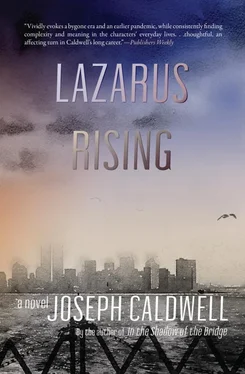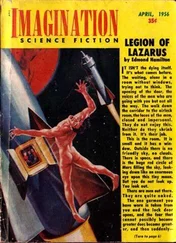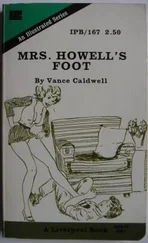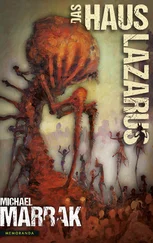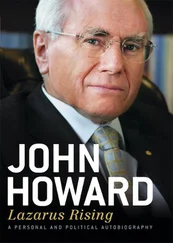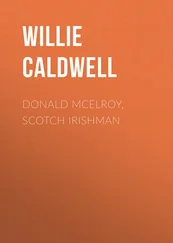Why Johnny had chosen this particular day to wash windows was beyond his understanding. It was hot; it was humid. The ailanthus trees in the small area between the firehouse and the brick wall of the warehouse behind gave him some cover, the leaves brushing against his back, his head, his arm, or waving slowly above him, fanning his neck, cooling the perspiration trickling down from under his hair. But the stones and bricks had been baking steadily for over a week, pulling in the heat. They were now in their sated state, warming the air to oven temperatures best suited for a turkey, a pork loin, or even a pizza. Still, Johnny had found himself missing the view, the lemon green of the ailanthus leaves, the grime-encrusted bricks, and the bright, clean gleam of the glass itself. And so he’d set to work, heat or no heat, the ailanthus leaves tickling his hair, his neck, and, if he was lucky, the inside of his ear.
His legs clamped over the windowsill, he rubbed the bunched towel against the outside glass, clearing away the dried cleaning wax he himself had bought so the job would be properly done. (Liquid sprays left an uneven gloss.) With his index finger inside the towel, he traced along the edges, digging into the corners, to make sure no smudges remained. To be sloppy about washing a window was a contradiction. It made the entire operation useless. It would blight the vision he was determined to make clear.
These were his favorite moments in the whole procedure: sitting outside, looking into the room through the clean window. The separation provided by the glass, the changed, opposing point of view, gave the inside of the room a strange and pleasing presence. What had been so familiar, the furniture and the artifacts among which he himself had moved with such easy inattention, now became remote. The lockers, wooden cupboards actually, that lined the walls, the lumpy couch, the overstuffed chair, the smudged television set arranged at the far end of the room, the old rowing machine the men themselves had bought to help fight off the flesh so easily accumulated during the inaction between alarms and excursions—all these became objects of fascination. Even Rickey Cameron there by his locker, rolling some socks and throwing them onto a shelf, had become a stranger, removed. Ed Acosta, pulling away at the oars of the rowing machine, appeared like someone who did not know him, whose life did not include Johnny Donegan.
What Johnny was being given was a glimpse of his absence, the world familiar but without him. This is how it would look when he was gone. He was being given a vision of a continuing action in which he would have no part. The vision he accepted as a gift, grateful that he’d been offered a sight so rare, pleased that he’d been allowed to observe, to participate in this strange moment of his own nonexistence.
Johnny pulled himself back from the window and looked for any remaining traces of the dried wax. He knew that Noonan and Rigney would come looking, determined to spot some missed streaks or clouded patches. Noonan would be stern; Rigney gleeful if an imperfection could be found. Noonan would pretend grave disappointment at the failure; Rigney would expect Johnny to revise his pretensions to adequacy.
Just as he was about to raise the window and climb back inside he saw a man coming up the stairs, into the room. It was the priest, the Friar Tuck who’d given him Communion at the cathedral. What Johnny first saw was the enormous face rising by degrees up out of the stairwell, the balding head, the black suit worn to a silken shine, the great shoulders, then the huge torso, lifted step by step up into the room. A measured pace gave dignity to the man’s arrival, a stateliness, a cadence and rhythm not necessarily imposed by the steps themselves. He was giving the handrail only the lightest touch with his fingertips, an acknowledgment rather than an employment. The one concession to gravitational pull was the downward bend of the shoulders, the forward thrust of the head. Perhaps the man was so accustomed to listening—to hearing confessions, to being heaped with insoluble problems—that his head was permanently inclined, prepared to be burdened by whatever ghastly or dreary difficulty a penitent might want to unload. He had long given up trying to right himself, to straighten his shoulders, to lift his head, to withdraw from the posture his calling had laid upon him.
Perhaps his calling accounted as well for the bulging eyes. To Johnny it seemed not impossible that the man had been told some gigantic truth that he was still struggling to comprehend, a truth so shattering that the eyes had opened wider to receive it and had never been able to return to their former repose.
Cameron and Acosta didn’t exactly jump to attention but they did manage to perform some respectful equivalent. Acosta swung around on the seat of the rowing machine. Cameron stopped tossing his socks into his locker, as if it were an act too frivolous to be performed in the presence of a priest. Acosta stood up next to the rowing machine as if ready for inspection.
The priest nodded to the two men. Cameron shook his hand, then Acosta. Now all three of them were looking toward Johnny, Cameron pointing and Acosta bobbing his head in Johnny’s direction. The priest nodded. Johnny was the man he’d come to see.
Acosta and Cameron, without being asked, prepared to leave the room. Acosta placed the oars neatly into position and rubbed his hand across the seat of the rowing machine. Cameron snapped the padlock on his locker, but so quietly that Johnny heard nothing through the glass. Acosta backed out of the room, waiting until he was at the top of the stairs before showing the least concern about where he was headed. Cameron shook the priest’s hand again, then gave a light tap to his locker door as he passed, a signal that the door was not to reopen in his absence.
The priest turned again toward Johnny. Johnny raised a hand then pointed to the window glass in front of him. He held up the bunched paper towel and made circular motions in the air. The priest nodded again in understanding and Johnny accepted the nod as permission to continue. Pretending to have seen a smudge, he rubbed the towel vigorously in the upper left corner, squinted, rubbed again, then took a few seconds to check for further failure. He found none.
The priest watched, patient, unmoving.
Up went the window and Johnny slid himself into the room. His joints—ankle, knee, and hip—were stiff and he quickly lifted one leg, then the other, to reassure them that their ordeal was over. “Sorry, Father,” he said, “I just had that little bit to finish.”
The priest held out his hand. “Father Dunphy. You may remember me. I’m sorry to interrupt.” He spoke in soft tones as if to an acquaintance of long standing for whom he felt a quiet sympathy. What surprised Johnny was that the man was not perspiring. No sweat showed on his forehead or on his face. His black suit was unrumpled; there were no stains or blotches anywhere, not even under the arms. Nor were there any markings on the starched Roman collar. The man was obviously exempt from discomfort.
“I remember you,” Johnny said. “From the Sunday at the cathedral.”
“And you’re John Donegan. A Mr. Conboy helped me find you. He—Mr. Conboy—is in your headquarters. In Brooklyn. Because of your medal. He showed me the Medal Day books for the past three years. There you were. A little over a year ago—you rescued a little girl.”
“Right.”
“Your hair isn’t as red as I remember it.”
“It changes. It’s really more brown or blond. Sometimes. Depending.”
“And you’re taller.”
Johnny shrugged. Father Dunphy continued to look directly at him, the quiet voice contradicting the bulging eyes.
“And you have to use a condom so you won’t get sick and die.”
Читать дальше
